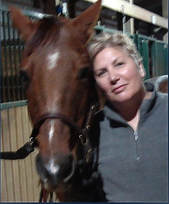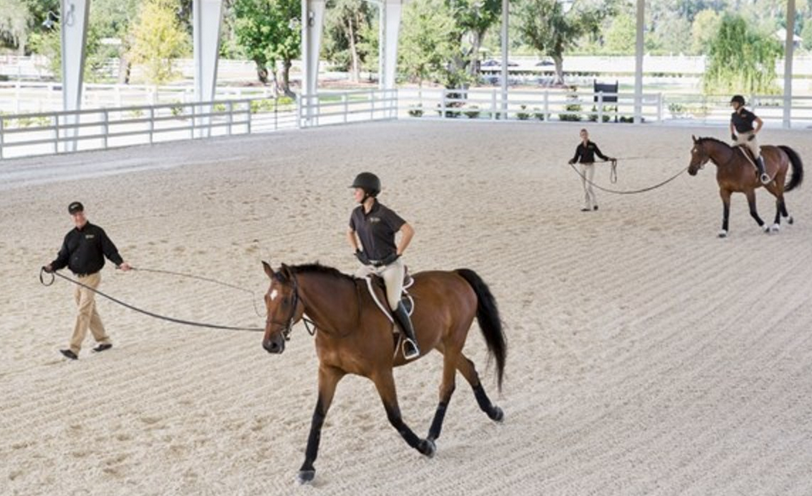How To Feel More Secure During Lunge Lessons
Five tips to feel safer on a longe line.
A reader asks, "How can I be less afraid during longe lessons?"
Longe lessons can be intimidating because you feel completely out of control. You are riding a 1,000 lb prey animal with lightning fast reflexes and a mind of its own, and you are dependent on your trainer to control the horse through the longe line. It’s not surprising that students often feel insecure and tense while being longed.
That said, here are a few things to consider:
Longe lessons can be intimidating because you feel completely out of control. You are riding a 1,000 lb prey animal with lightning fast reflexes and a mind of its own, and you are dependent on your trainer to control the horse through the longe line. It’s not surprising that students often feel insecure and tense while being longed.
That said, here are a few things to consider:
Pilates builds strong core muscles that improve balance and stability.
1. At first, hold on with your hands. The safest way to do this is to grab hold of the horse’s mane. It doesn’t hurt horses to do that the way it hurts a human to pull their hair. If you feel yourself start to slip out of the saddle, you can pull yourself back into the saddle safely that way. When you feel secure enough, then try just pressing your hand down on the pommel of the saddle to steady yourself. (I advise against holding onto the pommel because if the saddle slips, you will fall off with the saddle!) Keep your hand pressed onto the pommel for 5 steps (walk, trot, or canter), then raise your hand for a step or two. Continue doing that until you feel secure enough to keep your hand off the pommel entirely.
Wobble boards help build stability
that will transfer to the saddle.
that will transfer to the saddle.
2. Hold onto the reins with your other hand. The idea here is to just let yourself feel that the reins are there in case the horse starts to go forward faster than you feel comfortable going. Holding onto the buckle is usually enough. You can always gather up the reins in case of emergency to stop the horse.
3. You will feel insecure to the extent that your seat is unstable. If you are used to gripping with your knees to stay in the saddle, your trainer will probably work on getting you to release that grip, which will make you feel even more insecure.
This is how to to develop a secure seat.
This is how to to develop a secure seat.
4. You need to feel you can trust your trainer. If you have trouble trusting other people or if you don’t have confidence in your trainer’s competence, you will resist giving control over to him or her. Here are a couple of articles I wrote about how to tell whether you’ve got a good instructor/trainer:
How To Tell Whether You Have A Good Riding Instructor
How To Get The Most Out of a Riding Lesson (For Both Student and Trainer)
5. Often, the fear a rider feels in the saddle has nothing to do with riding. Toxic fear is a kind of fear that stems from unresolved trauma—which can include physical, emotional, or psychological trauma. Something as seemingly simple as the betrayal of a friend or a particularly humiliating incident at work can leave you feeling insecure inside. That insecurity will rise to the surface when you climb on the back of a 1,000 lb animal and need to rely on your own inner balance to remain safe. For more information about that, read these articles:
Dealing with Toxic Fear
How To Overcome Your Fear of Riding
Happy Riding!
Copyright June 27, 2019 Denise Cummins
The Thinking Equestrian
Opening Photo Credit: Practical Horseman, June 26, 2019, Savannah College of Art and Design longe lessons
How To Tell Whether You Have A Good Riding Instructor
How To Get The Most Out of a Riding Lesson (For Both Student and Trainer)
5. Often, the fear a rider feels in the saddle has nothing to do with riding. Toxic fear is a kind of fear that stems from unresolved trauma—which can include physical, emotional, or psychological trauma. Something as seemingly simple as the betrayal of a friend or a particularly humiliating incident at work can leave you feeling insecure inside. That insecurity will rise to the surface when you climb on the back of a 1,000 lb animal and need to rely on your own inner balance to remain safe. For more information about that, read these articles:
Dealing with Toxic Fear
How To Overcome Your Fear of Riding
Happy Riding!
Copyright June 27, 2019 Denise Cummins
The Thinking Equestrian
Opening Photo Credit: Practical Horseman, June 26, 2019, Savannah College of Art and Design longe lessons

Denise Cummins has over 30 years experience as an equestrian and horse business owner. In The Thinking Equestrian, she shares valuable tips on caring for and training horses, giving riding instruction, and running a successful horse business.
Opening Photo Credit: ID 75744821 © Fsstock | Dreamstime.com
|
|
|
|
|



